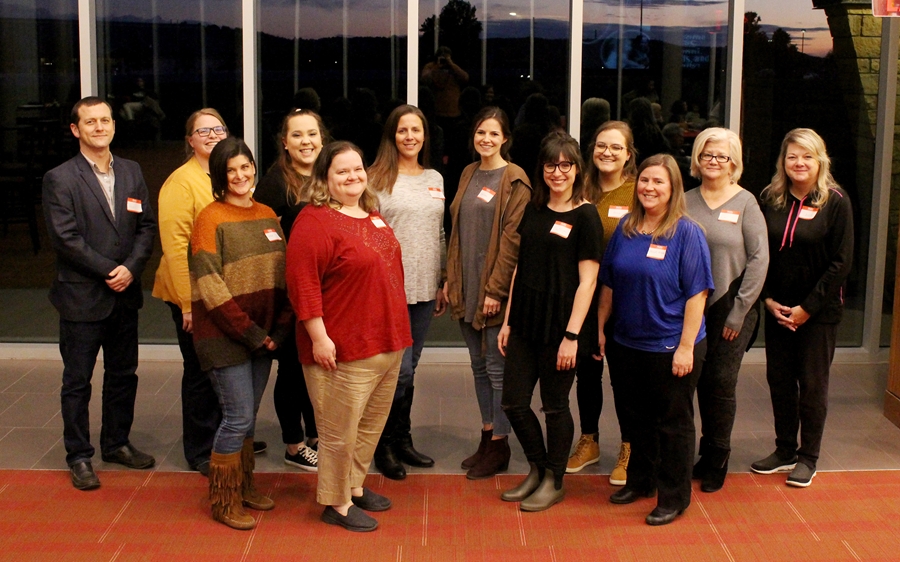
FAYETTEVILLE, Ark. – The School of Human Environmental Sciences in U of A's Dale Bumpers College of Agricultural, Food and Life Sciences hosted its first Alumni, Friends and Families event with a large portion of the night dedicated to the Jean Tyson Child Development Study Center.
Shelley McNally, executive director of education programs at the center, was recognized for her overall leadership and for guiding the program through the strenuous reaccreditation process by the National Association for the Education of Young Children.
The Jean Tyson Child Development Study Center provides a model early-childhood facility for children ages eight weeks to five years; serves as a teaching laboratory for students in human development and family sciences, and several other disciplines across campus; and serves as a research facility for faculty and graduate students. Accreditation by the National Association for the Education of Young Children places it among the top 10 percent of private-sector childcare facilities in the nation.
"The program is dynamic and special because our team of people brings different strengths with each one as important as the next," said McNally. "The center is nationally accredited because the team is dedicated to children, their families and the field of early childhood education. Each member makes a deliberate effort to model and implement the highest level of care for children and professionalism with adults."
McNally works closely with clinical assistant professor of birth to kindergarten Laura Herold to enrich experiences at the center for children, teachers and U of A students. Together they co-designed and led a study abroad tour to Rome and Reggio Emilia, Italy. Curriculum at the Tyson Child Development Study Center is based on the fundamental principles of the Reggio Emilia approach, which focuses on environment, documentation and project-based learning.
Last summer, they also created and designed a STEAM lab in the center, an innovative "tinkering" lab used to introduce children to science, technology, engineering, the arts and math by exploring and experimenting with various materials.
In addition, teachers from the center were recognized, including lead educators Jodi Bechtel, Sara Bailey, Kayla Gussy, Caitlyn Daniel, Ramie Parsons and Madison Smith, and assistant educators Makayla Holloway-McDonald, Alia Childress, Anna Kemper, Anna Street and Heather Hammel from the infant and toddler team; and lead educators Lori Harris, Padee Yang, Allyson Ohnstad-Johnson and Laura Lantz; and assistant educators April Shannon, Caitlin Hughes, Sydney Manley and Lexi Fifield from the preschool team.
"For the educators, the evidence of their success is not measured as much in numbers, but in the moments when their work pays off," said McNally. "When an infant, who has never been away from family, takes a bottle for the first time in days because she finally trusts her educator. Or when a preschooler solves a problem with another child using techniques she watched her educators use consistently. Or when a child writes his name for the first time and says 'I didn't know I knew how to do that!' The measure of each age group's success comes when we see 15 preschool age children gather on the playground and without the direction of an adult, play a game for almost an hour without excluding anyone. Each of these successes reflect the effort, invested time and energy of the educators in building up the self-worth of each child, making them feel like a special, accepted and involved member of our community."
Recent HESC Outstanding Alumni attending were also recognized, including Vernoice Baldwin and Mandy Kordsmeier from 2016, Kathryn Miller and Amy Cofer from 2017, and Richard Mireles and Stephanie Benton from 2018.
Baldwin is a retired faculty member and educator at the Tyson Child Development Study Center.
Doug Walsh, executive director of business and operations at the center, Debra Modisette, assistant director, Cathy Moses, cook, and Phillip Montague, facilities management, were also recognized.
"Doug is known by the teaching staff as someone who will listen and help," said McNally. "He makes sure employees understand their benefits, comforts them when they are overwhelmed, and is always friendly, funny and helpful. He has been the calm, consistent and constant presence through multiple transitions and the one we can bring anything to and he reacts respectfully. Nothing scares him.
"Debra manages the schedule, but does more than that," said McNally. "She is always willing to listen, step into a classroom to lend a hand, solve a problem or offer a suggestion. Her attention to detail helps keep everything organized and running smoothly."
About the Dale Bumpers College of Agricultural, Food and Life Sciences: Bumpers College provides life-changing opportunities to position and prepare graduates who will be leaders in the businesses associated with foods, family, the environment, agriculture, sustainability and human quality of life; and who will be first-choice candidates of employers looking for leaders, innovators, policy makers and entrepreneurs. The college is named for Dale Bumpers, former Arkansas governor and longtime U.S. senator who made the state prominent in national and international agriculture.
About the University of Arkansas: The University of Arkansas provides an internationally competitive education for undergraduate and graduate students in more than 200 academic programs. The university contributes new knowledge, economic development, basic and applied research, and creative activity while also providing service to academic and professional disciplines. The Carnegie Foundation classifies the University of Arkansas among only 2 percent of universities in America that have the highest level of research activity. U.S. News & World Report ranks the University of Arkansas among its top American public research universities. Founded in 1871, the University of Arkansas comprises 10 colleges and schools and maintains a low student-to-faculty ratio that promotes personal attention and close mentoring.
Topics
Contacts
Robby Edwards, director of communications
Dale Bumpers College of Agricultural, Food and Life Sciences
479-575-4625,